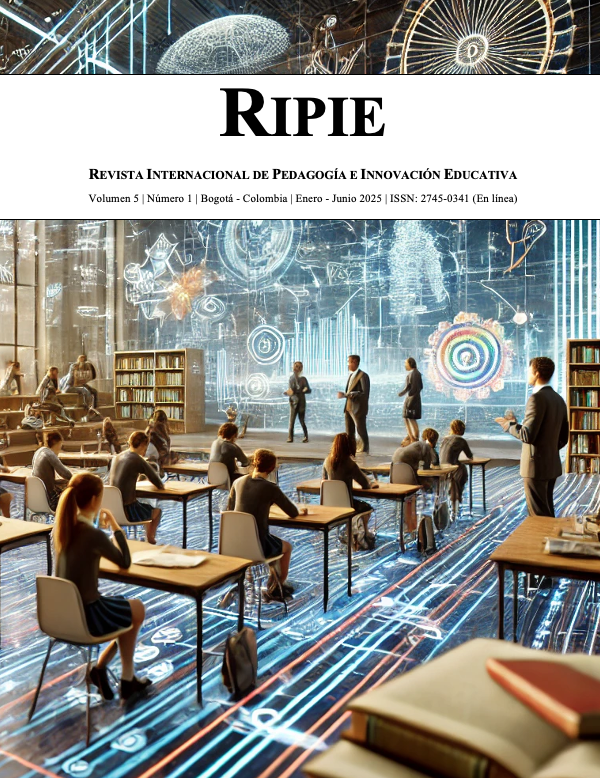Factores que influyen en el desarrollo de las competencias digitales en la región de Piła
DOI:
https://doi.org/10.51660/ripie51273Palabras clave:
educación digital, digitalización, correlaciones estadísticas, competencias digitales, tecnologías avanzadas, factores de desarrollo, recomendaciones educativasResumen
Este artículo examina los factores que influyen en el desarrollo de las competencias digitales en la región de Piła. Se identificaron elementos clave que influyen en estas competencias, incluida la educación de los empleados y las innovaciones tecnológicas, frente a factores demográficos. La investigación se realizó según la metodología de encuesta de diagnóstico, abarcando una muestra de 53 empresas y 1.312 empleados. Las correlaciones entre variables se analizaron mediante pruebas estadísticas, incluida la prueba de chi-cuadrado y la prueba t de Student. Los datos obtenidos mostraron fuertes correlaciones entre el gasto en educación y el nivel de competencias digitales, así como entre las inversiones en tecnologías modernas y las habilidades digitales de los empleados. Además, se observó un impacto significativo de factores demográficos como la educación, el género y la edad en el desarrollo de las competencias digitales. Los resultados resaltan la necesidad de intensificar las actividades educativas dirigidas a los empleados de grupos demográficos más difíciles, señalando el importante papel de las autoridades locales en el apoyo a estas tendencias. Las recomendaciones indican la necesidad de analizar más a fondo los factores que configuran las competencias digitales y las actividades que promueven la educación en este ámbito.
Descargas
Referencias
Batorski, D., & Płoszaj, A. (2012). Diagnosis and recommendations in the area of digital competencies. UW.
Bugowski, Ł. K., & Trzaska, K. (2024). The role of digital competencies in sustainable development. (pp. 161-176). UB.
Chądrzyński, M., Gruziel, K., Kacperska, E., Klusek, T., & Utzig, M. (2021). Poland in the era of digitalization. SGGW.
Chojnacka, O., Domańska, E., Jankiewicz, A., Kwaśnik, A., Lange, R., Pudłowska, A., Rylski, A., Rywczyńska, A., & Wrońska, A. (Eds.). (2022). The pandemic and changes in everyday use of the Internet. NASK National Research Institute.
Fiebich, Ł. (2018). Digital competencies – stationary training program. WSZiA.
Filipowicz, G. (2004). Management of professional competences. PWE.
Głomb, K. (2020). Digital transformation of the labour market and industry in the perspective of 2030. Stowarzyszenie Miasta w Internecie.
Jabłoński, M. (2016). The essence, references and attributes of employee competences in working with information. UE.
Jurek, Ł. (2023). The prospects of economic growth in the era of population ageing. In W. Koczur (Ed.), Economic consequences of demographic changes (pp. 65-77). Materials from the 3rd Demographic Congress.
Kucinski, K. (2010). Methodology of economic sciences. Difin.
Kupczyk, T., & Stor, M. (2017). Competence management: Theory, research and practice. WSH.
Maszke, A. W. (2004). Methodological foundations of research. URz.
Pilch, T., & Bauman, T. (2001). Principles of pedagogical research. Żak.
Walkowiak, R. (2024). Model of competencies of managers of local government organizations (p. 58). UW-M.
Górska-Rożej, K. (2014). Identification of competency components in the context of effective competency management. Obronność, 2(10), 12-31.
Kowalska, K. (2016). Deviant behaviour of minors. PTK, 23, 7-28.
Rogacka, M. (2022). Digital competencies in the workplace. E-mentor, 5(97), 53-64.
Helsper, E. (2014, March 25). Harnessing ICT for social action, a digital volunteering program. Paper presented at Digital Inclusion in Europe: Evaluating Policy and Practice, Spain.
Simon, F., & Yasmeen, M. (2018). Building tomorrow's digital skills: What conclusions can we draw from international comparative indicators? Report. Paris.
Skorupska, J. (2018). Artificial Intelligence and digital competencies of future employees. Council for Digitization.
Tarkowski, A., Majdecka, E., Penza-Gabler, Z., Sienkiewicz, M., & Stunża, G. D. (2018). Analysis of strategies and actions aimed at developing digital competencies in the European Union countries. Centrum Cyfrowe.
Vuorikari, R., Kluzer, S., & Punie, Y. (2022). Digital Competence Framework for Citizens. ECCC Foundation.
European Commission/EACEA/Eurydice. (2023). Digital Education at School in Europe. Eurydice Report. Publications Office of the European Union.
McKinsey & Company. (2016). A chance to jump into the global economic first league (pp. 25-29). Warsaw.
UNESCO. (2018). Managing tomorrow's digital skills - What conclusions we can draw from international comparative indicators.
Council of Ministers. (2023). Resolution No. 24 of 21 February 2023 on the establishment of a government program called the "Digital Competence Development Program". Journal of Laws, item 318.
European Parliament and Council. (2006). Recommendation of 18 December 2006 on key competencies for lifelong learning. Official Journal of the European Union, L 394/10.
Council of the European Union. (2018). Recommendation on Key Competencies for Lifelong Learning of 22 May 2018. ST 9009.
Drabik, L., Kubiak-Sokół, A., & Sobol, E. (2023). Dictionary of the Polish language. PWN.
GUS. (2019). Registered unemployed and unemployment rate in Piła County. As of the end of September 2019.
Descargas
Publicado
Número
Sección
Licencia
Derechos de autor 2025 Revista Internacional de Pedagogía e Innovación Educativa

Esta obra está bajo una licencia internacional Creative Commons Atribución-NoComercial-CompartirIgual 4.0.
Los artículos se publican bajo los términos de una licencia que permite el uso, distribución y reproducción en cualquier medio, siempre que el trabajo original se cite correctamente. Ed&TIC conserva los derechos patrimoniales de las obras publicadas y promueve activamente la reutilización de las mismas bajo los términos de la licencia mencionada anteriormente, lo que fomenta la difusión del conocimiento y la colaboración en la comunidad académica.


